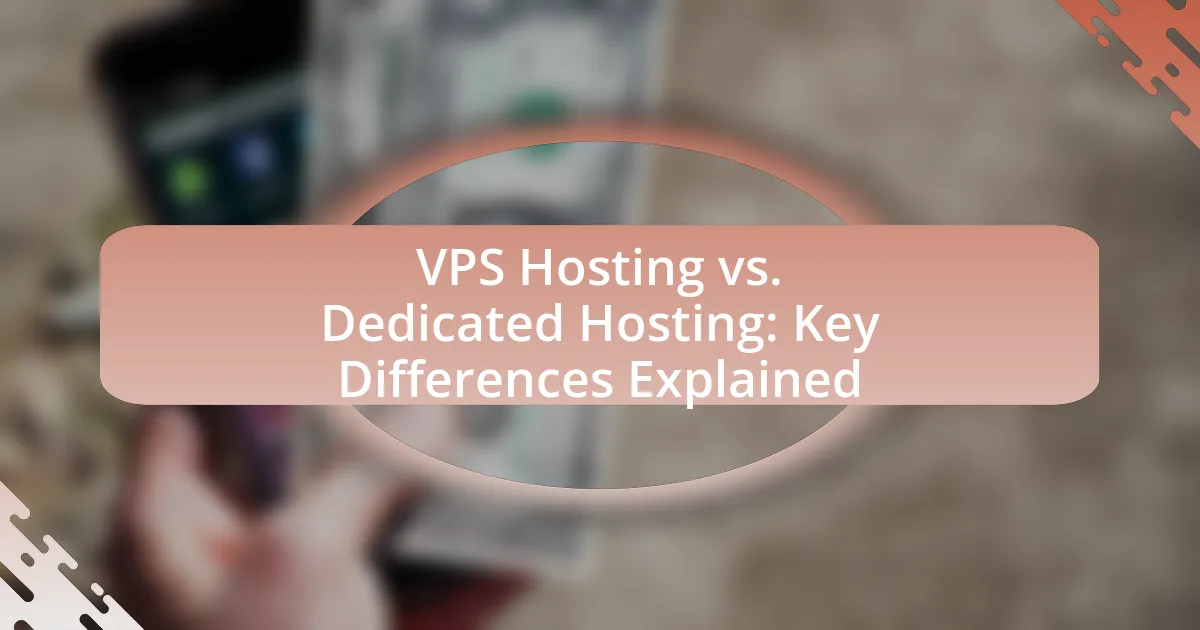VPS Hosting and Dedicated Hosting are two distinct types of web hosting solutions that cater to different user needs. VPS Hosting utilizes virtualization technology to allocate dedicated resources on a shared server, offering a balance of cost and performance, while Dedicated Hosting provides an entire physical server exclusively for one user, ensuring maximum performance, security, and control. The article explores the differences in resource allocation, advantages, use cases, pricing models, and factors influencing the choice between these two hosting options, helping businesses determine the most suitable solution based on their specific requirements and budget constraints.

What are VPS Hosting and Dedicated Hosting?
VPS Hosting, or Virtual Private Server Hosting, is a type of web hosting that uses virtualization technology to provide dedicated resources on a shared server. This means that while multiple users share the same physical server, each user has their own virtual environment with allocated CPU, RAM, and storage, allowing for greater control and customization compared to shared hosting.
Dedicated Hosting, on the other hand, refers to a hosting service where an entire physical server is exclusively leased to a single user or organization. This setup provides maximum performance, security, and control, as the user has full access to all server resources without sharing them with others.
Both VPS and Dedicated Hosting cater to different needs; VPS is often chosen for its balance of cost and performance, while Dedicated Hosting is preferred for high-traffic websites or applications requiring robust resources and security.
How do VPS Hosting and Dedicated Hosting differ in terms of resources?
VPS Hosting and Dedicated Hosting differ primarily in resource allocation. VPS Hosting allocates a portion of a physical server’s resources to multiple users, allowing for shared CPU, RAM, and storage, while Dedicated Hosting provides an entire server’s resources exclusively to one user. This means that in VPS Hosting, resources are virtualized and can be limited by the overall server load, whereas Dedicated Hosting guarantees full access to all server resources, ensuring optimal performance and reliability for high-demand applications.
What are the resource allocations for VPS Hosting?
Resource allocations for VPS hosting typically include dedicated CPU cores, a specific amount of RAM, allocated disk space, and a defined bandwidth limit. Each VPS operates in a virtualized environment, ensuring that these resources are reserved exclusively for the user, which enhances performance and reliability. For instance, a common allocation might be 2 CPU cores, 4 GB of RAM, 50 GB of SSD storage, and 1 TB of monthly bandwidth. This structure allows users to run applications and websites with greater control and efficiency compared to shared hosting, where resources are distributed among multiple users.
What are the resource allocations for Dedicated Hosting?
Dedicated hosting allocates all server resources exclusively to a single client, providing maximum performance and control. This includes dedicated CPU cores, RAM, storage, and bandwidth, which are not shared with other users. For instance, a dedicated server may offer configurations such as 16 CPU cores, 64 GB of RAM, 1 TB of SSD storage, and 1 Gbps bandwidth, ensuring optimal resource availability for high-traffic websites or applications. This allocation model supports enhanced security, customization, and reliability, making it suitable for businesses with demanding workloads.
What are the key advantages of VPS Hosting?
The key advantages of VPS Hosting include enhanced performance, greater control, and cost-effectiveness. VPS Hosting provides dedicated resources, which leads to improved website speed and reliability compared to shared hosting. Users have root access, allowing for custom software installations and configurations, which is not possible in shared environments. Additionally, VPS Hosting is more affordable than dedicated servers while still offering many of the same benefits, making it an attractive option for businesses looking to scale without incurring high costs.
How does VPS Hosting provide cost-effectiveness?
VPS Hosting provides cost-effectiveness by allowing multiple users to share the same physical server while maintaining dedicated resources, which reduces overall costs. This model enables businesses to access features like scalability, customization, and performance typically associated with dedicated servers at a fraction of the price. For instance, VPS plans can start as low as $20 per month, compared to dedicated servers that often exceed $100 monthly, making VPS a financially viable option for startups and small to medium-sized enterprises.
What scalability options does VPS Hosting offer?
VPS hosting offers several scalability options, including vertical scaling, which allows users to increase resources such as CPU, RAM, and storage within the existing server environment, and horizontal scaling, which enables the addition of more VPS instances to distribute the load. This flexibility is crucial for businesses experiencing fluctuating traffic demands, as it allows for adjustments without significant downtime or migration efforts. According to a study by HostingAdvice, 70% of businesses prefer VPS hosting for its ability to scale resources quickly and efficiently, demonstrating its effectiveness in meeting varying operational needs.
What are the key advantages of Dedicated Hosting?
The key advantages of Dedicated Hosting include enhanced performance, complete control, and improved security. Dedicated Hosting provides exclusive access to server resources, which results in superior speed and reliability, making it ideal for high-traffic websites and applications. Users have full administrative control over the server, allowing for customized configurations and software installations tailored to specific needs. Additionally, Dedicated Hosting offers heightened security measures, as the server is not shared with other users, reducing the risk of data breaches and cyber threats. These advantages make Dedicated Hosting a preferred choice for businesses requiring robust performance and security.
How does Dedicated Hosting enhance performance?
Dedicated hosting enhances performance by providing exclusive access to server resources, which eliminates competition for bandwidth, CPU, and memory. This exclusivity allows websites to handle higher traffic volumes and deliver faster load times. For instance, dedicated servers can support complex applications and databases more efficiently than shared environments, resulting in improved user experience and reduced latency. Additionally, dedicated hosting often includes advanced configurations and optimizations tailored to specific needs, further enhancing overall performance.
What security benefits does Dedicated Hosting provide?
Dedicated hosting provides enhanced security benefits by offering exclusive server resources, which significantly reduces the risk of security breaches. With dedicated hosting, users have full control over server configurations, allowing for tailored security measures such as firewalls, intrusion detection systems, and custom security protocols. This isolation from other users minimizes vulnerabilities associated with shared environments, where one compromised account can jeopardize others. Additionally, dedicated hosting often includes advanced security features like DDoS protection and regular security audits, further safeguarding sensitive data and ensuring compliance with industry standards.

What are the use cases for VPS Hosting and Dedicated Hosting?
VPS Hosting is commonly used for small to medium-sized businesses that require more control and resources than shared hosting can provide, while Dedicated Hosting is ideal for large enterprises or applications with high traffic demands that need maximum performance and security. VPS Hosting allows users to run custom software and manage their own server environment, making it suitable for web applications, development environments, and hosting multiple websites. In contrast, Dedicated Hosting offers complete server resources and is often utilized for resource-intensive applications, large databases, and high-traffic websites, ensuring optimal performance and reliability.
What types of businesses benefit from VPS Hosting?
Businesses that benefit from VPS Hosting include e-commerce sites, web development agencies, and companies with high traffic websites. E-commerce sites require reliable performance and security for transactions, which VPS Hosting provides through dedicated resources. Web development agencies often need to host multiple client websites, and VPS allows for customization and scalability. Companies with high traffic websites benefit from the enhanced performance and stability that VPS Hosting offers compared to shared hosting, ensuring that their sites remain accessible during peak times.
How does VPS Hosting support startups and small businesses?
VPS hosting supports startups and small businesses by providing a cost-effective solution that offers dedicated resources and enhanced performance compared to shared hosting. Startups and small businesses benefit from the scalability of VPS hosting, allowing them to easily upgrade resources as their needs grow without significant downtime or migration issues. Additionally, VPS hosting provides greater control and customization options, enabling businesses to configure their server environment to meet specific requirements. According to a study by HostingAdvice, 70% of small businesses reported improved website performance and reliability after switching to VPS hosting, highlighting its effectiveness in supporting business growth.
What applications are best suited for VPS Hosting?
VPS hosting is best suited for applications that require dedicated resources and enhanced performance without the cost of a dedicated server. These applications include web hosting for medium to high-traffic websites, e-commerce platforms that need reliable uptime, development and testing environments for software applications, and hosting for virtual private networks (VPNs) that require secure connections. The ability of VPS hosting to provide isolated environments with customizable configurations makes it ideal for these use cases, as it allows users to scale resources according to their needs while maintaining control over their server environment.
What types of businesses benefit from Dedicated Hosting?
Businesses that require high performance, security, and control benefit from Dedicated Hosting. This includes large enterprises, e-commerce platforms, and websites with high traffic volumes. For instance, e-commerce businesses often need dedicated resources to handle significant transaction loads and ensure data security, while large enterprises may require custom server configurations to meet specific operational needs. Additionally, organizations that handle sensitive data, such as financial institutions or healthcare providers, benefit from the enhanced security features that dedicated hosting offers, ensuring compliance with regulations like HIPAA or PCI-DSS.
How does Dedicated Hosting cater to large enterprises?
Dedicated Hosting caters to large enterprises by providing exclusive server resources, which ensures optimal performance, security, and customization. Large enterprises often require high levels of reliability and control over their hosting environments, which Dedicated Hosting offers through dedicated hardware, allowing for tailored configurations to meet specific business needs. Additionally, Dedicated Hosting supports high traffic volumes and resource-intensive applications, essential for large-scale operations. According to a study by HostingAdvice, 70% of large businesses prefer Dedicated Hosting for its enhanced security features, including dedicated firewalls and advanced DDoS protection, which are critical for safeguarding sensitive data.
What specific applications require Dedicated Hosting?
Dedicated hosting is required for applications that demand high performance, security, and resource allocation. Specific applications include large-scale e-commerce platforms, high-traffic websites, enterprise-level applications, and resource-intensive databases. These applications benefit from dedicated resources, ensuring optimal performance and reliability. For instance, e-commerce sites like Amazon experience significant traffic and require dedicated servers to handle transactions securely and efficiently. Additionally, applications that process sensitive data, such as financial services or healthcare systems, necessitate dedicated hosting to comply with regulatory standards and maintain data integrity.

How do pricing models compare between VPS Hosting and Dedicated Hosting?
VPS Hosting typically offers a lower pricing model compared to Dedicated Hosting. VPS plans generally range from $20 to $100 per month, depending on resources and features, while Dedicated Hosting can cost between $80 and $500 per month due to the exclusive use of physical server resources. This price difference arises because VPS Hosting utilizes virtualization technology to share a single server among multiple users, reducing costs, whereas Dedicated Hosting provides an entire server dedicated to one client, resulting in higher expenses for hardware, maintenance, and support.
What factors influence the pricing of VPS Hosting?
The pricing of VPS Hosting is influenced by several key factors, including resource allocation, server performance, management level, data center location, and additional features. Resource allocation refers to the amount of CPU, RAM, and storage assigned to each VPS, with higher allocations typically resulting in higher costs. Server performance is determined by the underlying hardware and technology used, where more advanced setups lead to increased pricing. The level of management, whether unmanaged or fully managed, also affects costs, as managed services require more support and resources. Data center location impacts pricing due to variations in operational costs and market demand in different regions. Lastly, additional features such as backups, security measures, and customer support can further influence the overall price of VPS Hosting plans.
How does the level of management affect VPS Hosting costs?
The level of management directly influences VPS Hosting costs, with fully managed services typically being more expensive than unmanaged options. Fully managed VPS Hosting includes comprehensive support, maintenance, and security, which increases operational costs for the provider, leading to higher prices for users. In contrast, unmanaged VPS Hosting requires users to handle server management tasks themselves, resulting in lower costs due to reduced provider responsibilities. According to a study by HostingAdvice, managed VPS services can cost up to 50% more than unmanaged services, reflecting the additional resources and expertise required for management.
What are the typical pricing tiers for VPS Hosting?
Typical pricing tiers for VPS hosting range from $5 to $100 per month, depending on the resources allocated. Entry-level VPS plans typically cost around $5 to $20 per month, offering limited CPU, RAM, and storage. Mid-tier plans generally range from $20 to $50 per month, providing more robust resources suitable for small to medium-sized businesses. High-end VPS hosting can cost $50 to $100 per month or more, delivering significant resources for larger applications or websites. These pricing structures reflect the varying levels of performance, support, and scalability offered by different VPS hosting providers.
What factors influence the pricing of Dedicated Hosting?
The pricing of Dedicated Hosting is influenced by several key factors, including hardware specifications, bandwidth allocation, support services, and geographical location of data centers. Higher hardware specifications, such as CPU power, RAM, and storage type (SSD vs. HDD), directly increase costs due to the enhanced performance and reliability they provide. Bandwidth allocation affects pricing as higher data transfer limits or faster connections require more investment from hosting providers. Additionally, the level of technical support offered, whether managed or unmanaged, can significantly impact pricing, with managed services typically costing more due to the additional resources involved. Finally, the geographical location of data centers can influence costs due to variations in operational expenses, such as electricity and real estate, which can vary widely from one region to another.
How does hardware choice impact Dedicated Hosting pricing?
Hardware choice significantly impacts Dedicated Hosting pricing by determining the overall performance, capacity, and reliability of the server. High-performance components, such as advanced CPUs, increased RAM, and faster SSD storage, typically lead to higher costs due to their enhanced capabilities and the demand for superior performance. For instance, a dedicated server equipped with dual Intel Xeon processors and 64GB of RAM will cost more than a server with a single processor and 16GB of RAM, reflecting the increased processing power and memory available for handling larger workloads. Additionally, the choice of hardware influences maintenance and operational costs, as more advanced systems may require specialized support and higher energy consumption, further driving up the overall pricing of dedicated hosting solutions.
What are the common pricing structures for Dedicated Hosting?
Common pricing structures for Dedicated Hosting typically include monthly, quarterly, and annual billing options. Monthly plans allow users to pay for services on a month-to-month basis, providing flexibility for short-term needs. Quarterly plans offer a slight discount for committing to three months, while annual plans often provide the most significant savings, incentivizing long-term contracts. Additionally, some providers may offer tiered pricing based on server specifications, such as CPU power, RAM, and storage capacity, with higher specifications commanding higher prices. According to a 2023 industry report, the average monthly cost for dedicated hosting ranges from $100 to $500, depending on the configuration and service level.
What should you consider when choosing between VPS Hosting and Dedicated Hosting?
When choosing between VPS Hosting and Dedicated Hosting, consider your specific resource needs and budget. VPS Hosting offers a virtualized environment with shared physical resources, making it more cost-effective for smaller projects or businesses with moderate traffic. In contrast, Dedicated Hosting provides an entire physical server dedicated to your needs, offering superior performance and control, which is ideal for high-traffic websites or applications requiring significant resources. Additionally, evaluate factors such as scalability, management level, and security requirements, as Dedicated Hosting typically offers enhanced security and customization options compared to VPS.
How do your business needs dictate the choice between VPS and Dedicated Hosting?
Business needs dictate the choice between VPS and Dedicated Hosting primarily based on resource requirements and budget constraints. For businesses with moderate traffic and resource needs, VPS offers a cost-effective solution with shared resources, while dedicated hosting provides exclusive resources for high-traffic websites or applications requiring maximum performance and security. According to a study by HostingAdvice, 70% of businesses opt for VPS when they need scalability and flexibility, whereas 30% choose dedicated hosting for mission-critical applications that demand high uptime and dedicated resources.
What are the long-term implications of choosing VPS vs. Dedicated Hosting?
Choosing VPS hosting typically results in lower long-term costs and greater scalability compared to dedicated hosting. VPS offers a shared environment with allocated resources, making it more cost-effective for businesses that anticipate growth but do not require the full power of a dedicated server. In contrast, dedicated hosting provides exclusive access to an entire server, which can lead to higher operational costs and less flexibility in resource allocation.
For example, a study by HostingAdvice in 2021 indicated that VPS hosting can reduce costs by up to 50% compared to dedicated hosting for similar workloads. Additionally, VPS allows for easier upgrades and resource adjustments, which is crucial for businesses experiencing fluctuating demands. Therefore, the long-term implications of choosing VPS over dedicated hosting include cost efficiency and adaptability, while dedicated hosting may offer superior performance but at a higher financial commitment and less flexibility.
What are some best practices for selecting the right hosting solution?
To select the right hosting solution, prioritize your specific needs, such as website traffic, resource requirements, and budget constraints. Assess the scalability options of the hosting provider to ensure it can accommodate future growth, as many businesses experience fluctuations in traffic. Evaluate the level of technical support offered, as reliable customer service can significantly impact your website’s uptime and performance. Additionally, consider the security features provided, including SSL certificates and DDoS protection, to safeguard your data. Research the provider’s reputation and read customer reviews to gauge reliability and performance. According to a survey by HostingAdvice, 70% of users prioritize customer support when choosing a hosting provider, highlighting its importance in the decision-making process.
How can you assess your resource needs effectively?
To assess your resource needs effectively, begin by analyzing your current and projected workload requirements. This involves evaluating factors such as website traffic, application performance, and data storage needs. For instance, if your website experiences high traffic, you may require more CPU and RAM, which are critical for maintaining performance. Additionally, consider the scalability of your resources; VPS hosting allows for easier adjustments compared to dedicated hosting. According to a study by HostingAdvice, 70% of businesses that switched to VPS hosting reported improved resource management and cost efficiency. This data supports the importance of accurately assessing resource needs to ensure optimal performance and cost-effectiveness.
What questions should you ask potential hosting providers?
When evaluating potential hosting providers, ask about their uptime guarantees, support availability, scalability options, and security measures. Uptime guarantees indicate reliability; for instance, a provider should offer at least 99.9% uptime, which is standard in the industry. Support availability is crucial; inquire if they provide 24/7 support through multiple channels. Scalability options are important for future growth; ensure the provider can accommodate increased resource needs without significant downtime. Lastly, security measures should include features like DDoS protection and regular backups, which are essential for safeguarding data.

